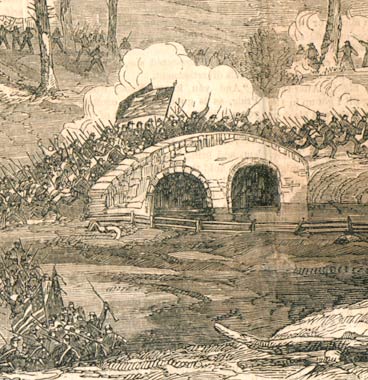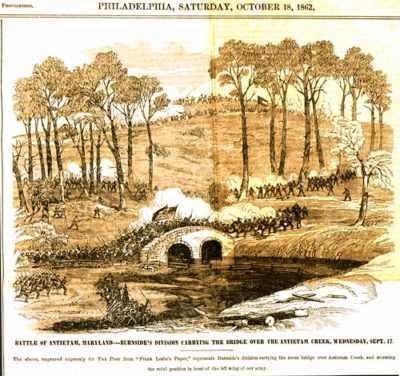Antietam: Our Post-Battle Report
September 17, 2012, marks the 150th anniversary of the Battle of Antietam, the bloodiest single-day battle in American history.
Late in the second year of the Civil War, the Confederate army switched from defense to offense. General Robert E. Lee marched the Army of Northern Virginia into Maryland, which had remained loyal to the Union.
He had recently defeated the Union forces at the Second Battle of Bull Run and decided it would be better to keep the momentum from this victory by a march into Union territory. Maryland was the natural choice; a large number of slaveholders in the state were strong supporters of the Confederacy. Lee hoped they would join his army and bring needed supplies. If he could score a victory against the Union forces, the Confederacy might win recognition from Great Britain and France. If so, the South could resume trade with Europe. The British Navy would break the Union’s blockade so that cotton could be shipped to the mills that were now laying idle from lack of material. Lincoln would have to fight the Confederacy and the British Empire. If Lee could win a victory.
The odds were in his favor. He was opposed by the Union’s General McClellan—an able administrator but a hesitant commander who always over-estimated the enemy. He had resisted Lincoln’s orders to move south toward Richmond. When Lincoln finally ordered him south, he was bluffed out of a strong position outside Richmond, Virginia, so close he could hear the church bells of the city.
Now Lee was coming at him. For the first time, the great Confederate commander would fight an offensive campaign, which was always more risky. It didn’t help that a union soldier found a copy of his strategy, copied for his generals. McClellan would never again have such an advantage. The Southern command soon realized that the orders had been found by the Union, but Lee stayed with his plan. McClellan attached Lee and, at Antietam, had the advantage for once.
Had he been a more decisive general—as determined as General Grant, for example—he might have defeated and captured Lee’s army. But McClellan wasn’t that bold or imaginative a general. And Lee was. The Confederates were able to withdraw their forces in the face of a large Union army.
All the same, it was a rare defeat for the Confederates. And for both sides, it was particularly bloody. In one day, nearly 23,000 Americans were killed, wounded, or missing.
Lincoln was shocked that General McClellan would not pursue the Confederate army and make it a decisive, war-determining battle. Yet, it was still a victory, and there had been very few for the North. Lincoln used the opportunity to announce a momentous change in policy, and a change in the direction of the war.
The following is taken from “The Recent Contests” from The Saturday Evening Post, September 27, 1862.
A week of anxiety ends with the joyful assurance that the rebel invaders have been forced to fly from “Maryland, My Maryland,” and entirely give up for the present the prospect of overrunning Pennsylvania.
It is evident that it was a most desperate struggle, in which though we can scarcely claim a decisive victory, the balance of advantages was decidedly in favor of the Union forces. The next day both armies were apparently too much exhausted to recommence the contest, the rebels probably secretly employing themselves in commencing their retreat into Virginia. On Friday, judging from our present advices, they completed their passage of the Potomac—with how much loss of men, trains, and artillery, we are yet unable to say. The amount of such loss of course will determine the extent of the disorganization they have sustained, and the character of the defeat they have suffered.
It is probable that the designs of the rebels in their recent movement were as follows:
1. To capture Harper’s Ferry and the 12,000 men at that place, by surrounding it, and moving on it from the North, from which side it is said to be least defensible, the Maryland heights being higher than the Virginia ones.
2. To replenish their supplies.
3. To raise Maryland in their favor, and largely recruit their forces.
4. To menace Baltimore and Washington, and the railroad communications of those cities with the North.
5. To invade Pennsylvania by way of the Cumberland Valley, allow us in this state to feel the ravages of war, supply themselves at will from our overflowing resources, and sicken us of the contest.
Of all these object the rebels have gained the first, and, it may be, in a degree, the second. Owing to shameful incompetency or treachery, Harper’s Ferry was captured. Whether the report of the recapture is true, we are at present unable to say.
But Maryland would not rise—even her secessionists will not put their property and lives in peril on so desperate a venture. For they see that even if the North were defeated, and the Union allowed to be dissevered, the North and Pennsylvania must at least insist on the Potomac for a border line.
To cross the Potomac is in fact to invade Pennsylvania—recent events have impressed this upon the great majority of our population. It therefore does not seem possible for Maryland to be severed from Pennsylvania without exposing both of them to great peril.

